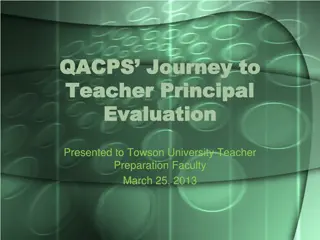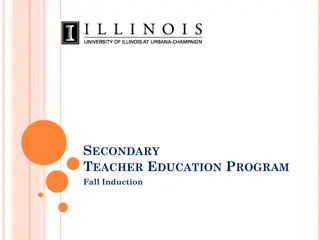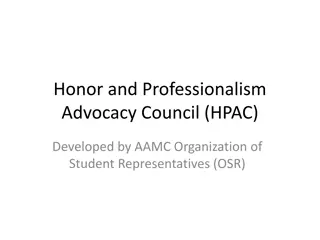Understanding Teacher Professionalism in Education Reform Contexts
Amy Aukland, PhD in Education, discusses the significance of teacher professionalism in Scotland and Wales, emphasizing the challenges and various concepts associated with it. The focus is on how enhancing teacher professionalism can lead to better teaching quality and overall educational improvement. The discussion includes the role of teacher autonomy, accountability, and different forms of professionalism. Various structures and mechanisms enabling good teaching are explored, highlighting the importance of shared responsibility in achieving educational goals.
Download Presentation

Please find below an Image/Link to download the presentation.
The content on the website is provided AS IS for your information and personal use only. It may not be sold, licensed, or shared on other websites without obtaining consent from the author. Download presentation by click this link. If you encounter any issues during the download, it is possible that the publisher has removed the file from their server.
E N D
Presentation Transcript
Amy Aukland PhD Education (Year 1) Teacher Professionalism and Good Teaching: Policy and Practice in Scotland and Wales Context: education reform in Scotland and Wales. Teacher professionalism key to educational improvement. Professional learning, professional standards, curriculum co- construction, research-literacy. (Scottish Government, 2016; Welsh Government, 2017) Teacher professionalism demonstrates the overall quality of the teaching workforce in Scotland (Scottish Government, 2016, p. 12) Problems: What kind of professional learning? (Biesta, 2017; Mockler, 2020) Focus on individual teacher capacity. (Priestley et al., 2015)
Amy Aukland PhD Education (Year 1) Teacher Professionalism and Good Teaching: Policy and Practice in Scotland and Wales Teacher professionalism: a contested concept. - Knowledge - Autonomy - Accountability (Furlong et al., 2000; Sachs, 2001; Biesta, 2017; Larsen et al., 2020) Managerial professionalism Democratic professionalism Collaborative professionalism Transformative professionalism Moral professionalism Teacher Professionalism: the guiding principles of conduct and governance established to improve the quality of teaching. (my definition, drawing on: Darling-Hammond, 1990; Sockett, 1993; Hargreaves, 2000) So: teacher professionalism should enable good teaching.
Amy Aukland PhD Education (Year 1) Teacher Professionalism and Good Teaching: Policy and Practice in Scotland and Wales Why is this important? Excessive responsibility on individual teacher capacity. Tensions in practice. (Moore & Clarke, 2016; Tatto, 2021; Browes & Altinyelken, 2022) Question of good teaching. Quality of teaching depends on its PURPOSE. TEACHER PROFESSIONALISM: What structures/mechanisms can enable good teaching? THE ROLE OF THE TEACHER: What do we want our teachers to achieve? AIMS OF EDUCATION: What do we want our education to achieve? Informs Enables Enables Informs
Teacher Professionalism and Good Teaching: Policy and Practice in Scotland and Wales Amy Aukland PhD Education (Year 1) References Biesta, G. J. J. (2017) Education, Measurement and the Professions: reclaiming a space for democratic professionality in education , Educational Philosophy and Theory, 49(4), pp. 315-330. Browes, B. and Altinyelken, H. K. (2022) Professionalism in the era of accountability: Role discrepancy and responses among teachers in the Netherlands , The British Journal of Sociology, 73(1), pp. 188-205. Darling-Hammond, L. (1990) Teacher Professionalism: Why and How . In: Lieberman, A. (ed.) Schools as Collaborative Cultures: Creating the Future Now, 1st ed. Hampshire: The Falmer Press, pp. 25-50. Furlong, J., Barton, L., Miles, S., Whiting, C., and Whitty, G. (2000) Teacher Education in Transition: Re-forming Professionalism? 1st ed, Buckingham: Open University Press. Hargreaves, A. (2000) Four Ages of Professionalism and Professional Learning , Teachers and Teaching, 6(2), pp. 151-182. Larsen, E., Moller, J., and Jensen, R. (2020) Constructions of professionalism and the democratic mandate in education: A discourse analysis of Norwegian public policy documents , Journal of Education Policy, DOI: 10.1080/02680939.2020.1774807. Available at: https://doi.org/10.1080/02680939.2020.1774807. (Accessed 22/05/21) Mockler, N. (2020) Teacher professional learning under audit: reconfiguring practice in an age of standards , Professional Development in Education, pp. 1-15, DOI: 10.1080/19415257.2020.1720779. Moore, A. and Clarke, M. (2016) Cruel Optimism : a teacher attachment to professionalism in an era of performativity , Journal of Education Policy, 31(5), pp. 666-677. Priestley, M., Biesta, G. and Robinson, S. (2015) Teacher Agency: An Ecological Approach. 1st ed. London: Bloomsbury. Pring, R. (2015) Philosophy of Educational Research, 3rd ed., London: Bloomsbury Publishing Plc. Sachs, J. (2001) Teacher professional identity: competing discourses, competing outcomes , Journal of Education Policy, 16(2), pp. 149-161. Scottish Government (2016) National Improvement Framework for Scottish Education: Achieving Excellence and Equity. Edinburgh: APS Group. Sockett, H. (1993) The Moral Base for Teacher Professionalism, 1st ed. New York: Teachers College Press. Tatto, M. T. (2021) Professionalism in teaching and the role of teacher education , European Journal of Teacher Education, 44(1), pp. 20-44. Welsh Government (2017) Education in Wales: Our National Mission. Action Plan 2017-21. Cardiff: Crown.















